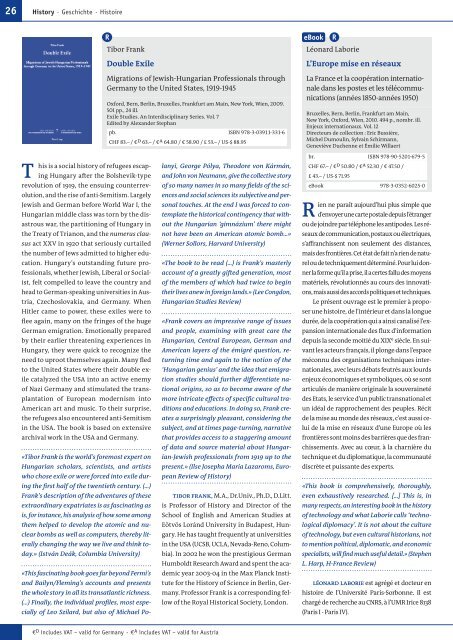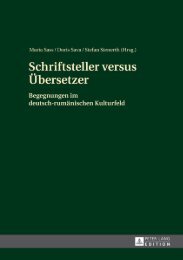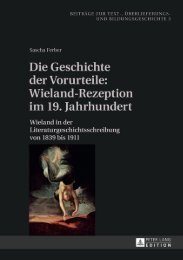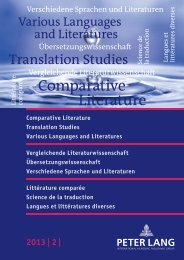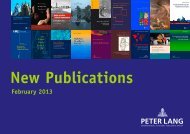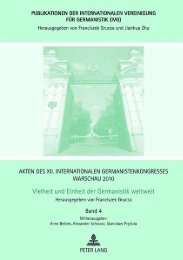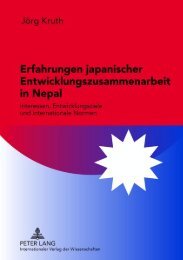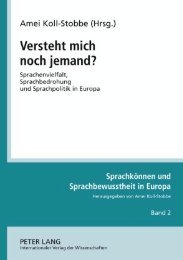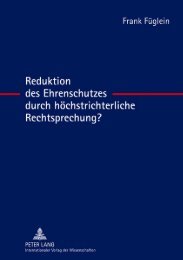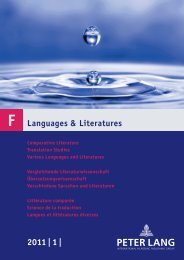Erfolgreiche ePaper selbst erstellen
Machen Sie aus Ihren PDF Publikationen ein blätterbares Flipbook mit unserer einzigartigen Google optimierten e-Paper Software.
26 History · Geschichte · Histoire<br />
T<br />
Tibor Frank<br />
Double Exile<br />
his is a social history of refugees escaping<br />
Hungary after the Bolshevik-type<br />
revolution of 1919, the ensuing counterrevolution,<br />
and the rise of anti-Semitism . Largely<br />
Jewish and German before World War I, the<br />
Hungarian middle class was torn by the disastrous<br />
war, the partitioning of Hungary in<br />
the Treaty of Trianon, and the numerus clausus<br />
act XXV in 1920 that seriously curtailed<br />
the number of Jews admitted to higher education<br />
. Hungary’s outstanding future professionals,<br />
whether Jewish, Liberal or Socialist,<br />
felt compelled to leave the country and<br />
head to German-speaking universities in Austria,<br />
Czechoslovakia, and Germany . When<br />
Hitler came to power, these exiles were to<br />
flee again, many on the fringes of the huge<br />
German emigration . Emotionally prepared<br />
by their earlier threatening experiences in<br />
Hungary, they were quick to recognize the<br />
need to uproot themselves again . Many fled<br />
to the United States where their double exile<br />
catalyzed the USA into an active enemy<br />
of Nazi Germany and stimulated the transplantation<br />
of European modernism into<br />
American art and music . To their surprise,<br />
the refugees also encountered anti-Semitism<br />
in the USA . The book is based on extensive<br />
archival work in the USA and Germany .<br />
«Tibor Frank is the world’s foremost expert on<br />
Hungarian scholars, scientists, and artists<br />
who chose exile or were forced into exile during<br />
the first half of the twentieth century. (...)<br />
Frank’s description of the adventures of these<br />
extraordinary expatriates is as fascinating as<br />
is, for instance, his analysis of how some among<br />
them helped to develop the atomic and nuclear<br />
bombs as well as computers, thereby literally<br />
changing the way we live and think today.»<br />
(István Deák, Columbia University)<br />
«This fascinating book goes far beyond Fermi’s<br />
and Bailyn/Fleming’s accounts and presents<br />
the whole story in all its transatlantic richness.<br />
(...) Finally, the individual profiles, most especially<br />
of Leo Szilard, but also of Michael Po-<br />
Migrations of Jewish-Hungarian Professionals through<br />
Germany to the United States, 1919-1945<br />
Oxford, Bern, Berlin, Bruxelles, Frankfurt am Main, New York, Wien, 2009 .<br />
501 pp ., 24 ill .<br />
Exile Studies . An Interdisciplinary Series . Vol . 7<br />
Edited by Alexander Stephan<br />
pb . ISBN 978-3-03911-331-6<br />
CHF 83 .– / € D 63 .– / € A 64 .80 / € 58 .90 / £ 53 .– / US-$ 88 .95<br />
€ D includes VAT – valid for Germany · € A includes VAT – valid for Austria<br />
lanyi, George Pólya, Theodore von Kármán,<br />
and John von Neumann, give the collective story<br />
of so many names in so many fields of the sciences<br />
and social sciences its subjective and personal<br />
touches. At the end I was forced to contemplate<br />
the historical contingency that without<br />
the Hungarian ‘gimnázium’ there might<br />
not have been an American atomic bomb...»<br />
(Werner Sollors, Harvard University)<br />
«The book to be read (...) is Frank’s masterly<br />
account of a greatly gifted generation, most<br />
of the members of which had twice to begin<br />
their lives anew in foreign lands.» (Lee Congdon,<br />
Hungarian Studies Review)<br />
«Frank covers an impressive range of issues<br />
and people, examining with great care the<br />
Hungarian, Central European, German and<br />
American layers of the émigré question, returning<br />
time and again to the notion of the<br />
‘Hungarian genius’ and the idea that emigration<br />
studies should further differentiate national<br />
origins, so as to become aware of the<br />
more intricate effects of specific cultural traditions<br />
and educations. In doing so, Frank creates<br />
a surprisingly pleasant, considering the<br />
subject, and at times page-turning, narrative<br />
that provides access to a staggering amount<br />
of data and source material about Hungarian-Jewish<br />
professionals from 1919 up to the<br />
present.» (Ilse Josepha Maria Lazaroms, European<br />
Review of History)<br />
tiBor Frank , M .A ., Dr .Univ ., Ph .D ., D .Litt .<br />
is Professor of History and Director of the<br />
School of English and American Studies at<br />
Eötvös Loránd University in Budapest, Hungary<br />
. He has taught frequently at universities<br />
in the USA (UCSB, UCLA, Nevada-Reno, Columbia)<br />
. In 2002 he won the prestigious German<br />
Humboldt Research Award and spent the academic<br />
year 2003-04 in the Max Planck Institute<br />
for the History of Science in Berlin, Germany<br />
. Professor Frank is a corresponding fellow<br />
of the Royal Historical Society, London .<br />
Léonard Laborie<br />
L’Europe mise en réseaux<br />
La France et la coopération internationale<br />
dans les postes et les télécommunications<br />
(années 1850-années 1950)<br />
Bruxelles, Bern, Berlin, Frankfurt am Main,<br />
New York, Oxford, Wien, 2010 . 494 p ., nombr . ill .<br />
Enjeux internationaux . Vol . 12<br />
Directeurs de collection : Eric Bussière,<br />
Michel Dumoulin, Sylvain Schirmann,<br />
Geneviève Duchenne et Émilie Willaert<br />
br . ISBN 978-90-5201-679-5<br />
CHF 67 .– / € D 50 .80 / € A 52 .30 / € 47 .50 /<br />
£ 43 .– / US-$ 71 .95<br />
eBook 978-3-0352-6025-0<br />
R<br />
ien ne paraît aujourd’hui plus simple que<br />
d’envoyer une carte postale depuis l’étranger<br />
ou de joindre par téléphone les antipodes . Les réseaux<br />
de communication, postaux ou électriques,<br />
s’affranchissent non seulement des distances,<br />
mais des frontières . Cet état de fait n’a rien de naturel<br />
ou de techniquement déterminé . Pour lui donner<br />
la forme qu’il a prise, il a certes fallu des moyens<br />
matériels, révolutionnés au cours des innovations,<br />
mais aussi des accords politiques et techniques .<br />
Le présent ouvrage est le premier à proposer<br />
une histoire, de l’intérieur et dans la longue<br />
durée, de la coopération qui a ainsi canalisé l’expansion<br />
internationale des flux d’information<br />
depuis la seconde moitié du XIXe siècle . En suivant<br />
les acteurs français, il plonge dans l’espace<br />
méconnu des organisations techniques internationales,<br />
avec leurs débats feutrés aux lourds<br />
enjeux économiques et symboliques, où se sont<br />
articulés de manière originale la souveraineté<br />
des Etats, le service d’un public transnational et<br />
un idéal de rapprochement des peuples . Récit<br />
de la mise au monde des réseaux, c’est aussi celui<br />
de la mise en réseaux d’une Europe où les<br />
frontières sont moins des barrières que des franchissements<br />
. Avec au cœur, à la charnière du<br />
technique et du diplomatique, la communauté<br />
discrète et puissante des experts .<br />
«This book is comprehensively, thoroughly,<br />
even exhaustively researched. [...] This is, in<br />
many respects, an interesting book in the history<br />
of technology and what Laborie calls ‘technological<br />
diplomacy’. It is not about the culture<br />
of technology, but even cultural historians, not<br />
to mention political, diplomatic, and economic<br />
specialists, will find much useful detail.» (Stephen<br />
L. Harp, H-France Review)<br />
léonard laBorie est agrégé et docteur en<br />
histoire de l’Université Paris-Sorbonne . Il est<br />
chargé de recherche au CNRS, à l’UMR Irice 8138<br />
(Paris I - Paris IV) .


